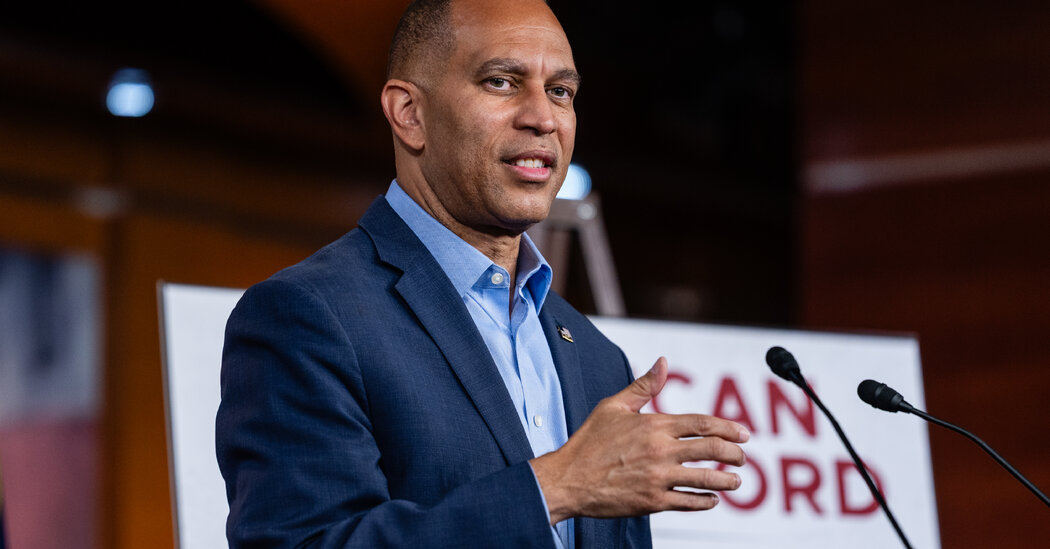Representative Hakeem Jeffries, the House Democratic leader, endorsed Zohran Mamdani for New York City mayor on Friday, the latest sign that skeptical party officials are swallowing concerns about their nominee as Election Day nears.
The endorsement by Mr. Jeffries, a Brooklyn Democrat, is more meaningful than most. A national party leader, he is also one of the city’s most prominent Black politicians and has been a sharp critic of the Democratic Socialists of America, which counts Mr. Mamdani as a member.
In a statement to The New York Times, Mr. Jeffries acknowledged that the two men had “areas of principled disagreement.” But he said that Mr. Mamdani had won “a free and fair election” in the Democratic primary and emphasized that the party needed to unite in the face of an “existential” threat from President Trump.
“Zohran Mamdani has relentlessly focused on addressing the affordability crisis and explicitly committed to being a mayor for all New Yorkers, including those who do not support his candidacy,” Mr. Jeffries wrote.
He added: “In that spirit, I support him and the entire citywide Democratic ticket in the general election.”
The endorsement came in a written statement just a day before early voting is set to begin. People familiar with his thinking said Mr. Jeffries had planned to announce the endorsement earlier but pushed it back because of the ongoing government shutdown.
Mr. Jeffries is the most recent member of the Democratic establishment to be won over by Mr. Mamdani, a 34-year-old state assemblyman and the front-runner in the race, as the mayoral campaign accelerates toward its conclusion on Nov. 4. Other notable endorsers in recent weeks include Gov. Kathy Hochul and Carl Heastie, the State Assembly speaker.
Mr. Jeffries’s decision had been the subject of prolonged speculation, as the leader teased a potential announcement for months but repeatedly bristled when asked about it in television interviews.
Both at home and nationally, he was under intense competing pressures. On one side are House Democrats and local leaders who believe Mr. Mamdani’s success offers a progressive model; on the other are swing district candidates and donors who believe he will be potent fodder for Republicans in next year’s high-stakes midterm elections.
And hanging over all of it is the specter that Mr. Jeffries himself could face a left-wing primary challenge in his central Brooklyn district next year from forces aligned with Mr. Mamdani. The leader has said he would welcome one.
Several high-profile New York Democrats facing a similar set of concerns remain uncommitted to their party’s nominee. Neither of New York’s senators — Chuck Schumer, the Senate Democratic leader, and Kirsten Gillibrand — have made an endorsement in the mayor’s race and appear unlikely to. Jay Jacobs, the state party chairman, said outright that he would not endorse Mr. Mamdani, citing the candidate’s democratic socialist beliefs and sharp criticism of Israel.
Mr. Jeffries’s endorsement dealt a blow to former Gov. Andrew M. Cuomo, who is running as a third-party candidate after losing June’s Democratic primary. Mr. Cuomo has exploited festering divisions in his party to try to rally a coalition of moderate Democrats, independents and Republicans against Mr. Mamdani, but remains in a distant second place in the polls.
Mr. Cuomo’s longtime right hand, Melissa DeRosa, called at least two members of New York’s congressional delegation this week asking them to try to dissuade Mr. Jeffries from endorsing Mr. Mamdani, according to two people familiar with the discussions.
Ms. DeRosa told Representatives Tom Suozzi and Joe Morelle, two Democrats close to Mr. Jeffries, that he should hold off endorsing because Mr. Sliwa could soon be quitting the race, potentially boosting Mr. Cuomo’s electoral chances, the people said. (Mr. Sliwa has repeatedly made clear he will not drop out under any circumstances.)
A spokesman for Mr. Cuomo did not immediately comment.
Mr. Cuomo did pick up a high-profile endorsement of his own on Thursday from Mayor Eric Adams, who abandoned his own re-election campaign last month amid abysmal polling numbers. The two men stood together to warn that Mr. Mamdani’s ideology and relative inexperience would jeopardize the city’s security.
Formerly hesitant Democrats like Mr. Jeffries who are now moving to endorse Mr. Mamdani appear to have gotten something out of their courtship with the nominee.
Under pressure from party leaders, Mr. Mamdani has shed some leftist positions he held in the past, promised to apologize for comments calling the Police Department racist and said he would discourage the use of “globalize the intifada,” a phrase that supporters of the Palestinian cause have embraced as a cry for freedom but that many Jews see as a threat of violence.
And this week, he confirmed a report by The New York Times that he planned to keep Jessica Tisch, the widely respected police commissioner, in her role if he is elected.
In his statement, Mr. Jeffries cited several of those shifts. He called the candidate’s commitment to keep Ms. Tisch “the approach that this moment requires.”
“Assemblyman Mamdani has promised to focus on keeping every New Yorker safe, including the Jewish community that has confronted a startling rise in antisemitic incidents as well as Black and Latino neighborhoods that have battled deadly gun violence for years,” he said.
Public polling suggests that Mr. Mamdani is entering the race’s final days in an enviable position. Mr. Cuomo has all but conceded he may not be able to win as long as Curtis Sliwa, the Republican nominee, remains in the race and attracts a slice of anti-Mamdani votes.
Mr. Jeffries first met with Mr. Mamdani back in July in the East New York neighborhood of Brooklyn, shortly after the candidate stunned New York Democrats by defeating Mr. Cuomo in the party’s primary.
But Mr. Jeffries had resisted offering his support, amid a mix of parochial political disputes and concerns from swing district Democrats that embracing Mr. Mamdani would hurt them in next year’s midterms.
Mr. Jeffries’s top priority is winning back the House, and he spent the summer hearing from Democratic candidates and some of the party’s most prolific donors across the country. They had deep concerns about Mr. Mamdani’s plans to raise taxes; his past support, which he has since disavowed, for defunding the police; and his statements on Israel, which have passionately divided Jewish Democrats.
The two men discussed those topics at their meeting in July, and they met again in August, alongside pastors and other civic leaders, at Mr. Jeffries’s home church in the Bedford-Stuyvesant neighborhood.
Mr. Jeffries also had other, more local concerns. For years, he has been one of the most active players in a political and cultural struggle in his district. On one side is the older, moderate Black community that Mr. Jeffries comes from. On the other are the wealthier, progressive residents — many of whom are white — who are contributing to the area’s gentrification.
Many of Mr. Jeffries’s advisers see Mr. Mamdani, who handily won the congressman’s district in the primary by activating young voters in remarkable numbers, as a representative of the gentrifying class. They fear that he and his allies could back primary challenges against local lawmakers who are to their right.
After democratic socialists empowered by Mr. Mamdani’s primary victory began crowing about backing potential primary challengers across the city, Mr. Jeffries’s team seemed to stoke the fight.
An aide to Mr. Jeffries told CNN in early July that if “Team Gentrification” wanted to challenge him in a primary, the response would be “forceful and unrelenting.”
Months later, Chi Ossé, a city councilman from Brooklyn, briefly discussed the possibility of running a primary challenge against Mr. Jeffries from the left. But he quickly backed down and said he had no intention of running.
But on Friday, Mr. Jeffries said he appreciated that Mr. Mamdani had made a “strong commitment” to trying to build more housing and lower costs in “working-class neighborhoods of color that have been hurt by gentrification and housing displacement.”
Benjamin Oreskes contributed reporting.
Nicholas Fandos is a Times reporter covering New York politics and government.
Jeffery C. Mays is a Times reporter covering politics with a focus on New York City Hall.
The post Hakeem Jeffries Gives Mamdani Last-Minute Endorsement for N.Y.C. Mayor appeared first on New York Times.




